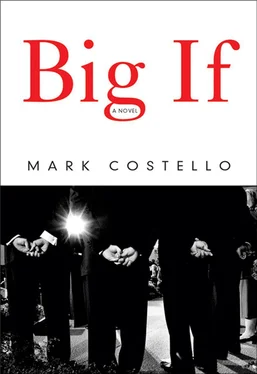It was typical of Peta to make a point of reading Vi’s book when Vi was there, a thoughtful little gesture. Vi knew that Bomb-Dog Bob was a creepy and not exactly age-appropriate choice. She had bought it just before she had cleared out of Beltsville for her mental health leave in May. Coming home, she’d felt she ought to bring a gift for Kai, and Bomb-Dog Bob was the only kid’s book they sold at the Protection Campus gift shop.
“I don’t want Bomb Bob ,” said Kai on the couch. “Momma, I want Lollipops . You read it.”
“That’s not such a nice way to talk,” Peta said. “What do we say when we want something?”
“Read it, Momma.”
“ Please . The magic word is please .”
“Please Momma please I want please Lollipops please.”
“But that’s a baby book, Kai. Your Auntie Vi’s book is more for big guys like you. It’s the story of the Secret Service, which is where she works. Look, Kai, there’s a dog. His name is Bob. Can you guess what he’s looking for under that big limousine? When he’s done, he gets a special treat.”
Vi heard something hit the wall.
Peta said, “We don’t throw books, Kai.” Her voice was controlled. “That book was a gift from somebody who loves you a whole lot. Pick it up, son.”
“What’s the magic word?” asked Kai.
“Pick up the damn book.”
Vi couldn’t hear what Kai said.
Peta said, “I’m counting, Kai. One — Two—”
Jens said, “He loses his nerve around three usually.”
“Thank you,” Peta said. “Now get back on the couch.”
Vi listened as Peta read to Kai.
“‘Licky was a lollipop,’” Peta started bouncingly. “‘One day he asked his daddy, “What’s this big stick for?”’”
Kai said, “You’re skipping the beginning.”
“This is the beginning,” Peta said. “See Licky with his daddy?”
“Read the first page — Momma look.”
“Oh all right,” said Peta. She read, “‘ Look Out For Lollipops, by Nancy Kleinfelt and Joan Melissa Oates. A My First Reader Book. London. New York. Sydney.’”
Kai turned the page for her.
Peta read, “‘ Look Out for Lollipops’ by Nancy Kleinfelt and Joan Melissa Oates. All rights reserved. Printed in the United States of America. No part of this book may be reproduced or transmitted in any form or by any means—’”
Kai sighed. This was his favorite part of every book — his mother’s voice, the certainties.
“‘—electronic or mechanical, including photocopying, recording, or any information storage and retrieval system without written permission from the publisher.’”
Kai said, “I love you, Momma.”
Peta said, “I love you too. Now let’s read about Bob. I’m curious, aren’t you?”
Kai said, “No — more Lollipops .”
“‘Licky was a lollipop.’ God I hate this book. ‘One day he asked his daddy, “What’s this big stick for?” His daddy said, “That’s so they can lick you, son—”’”
Kai turned the pages as Peta read them. Together, they followed Licky’s journey of discovery to the candy emperor and finally to the belly of the boy who loved him best of all. They came to the last word on the last page, which was actually all .
Peta said, “The end.” She closed Lollipops solemnly.
Peta carried Kai past Jens and Auntie Vi for a round of sloppy goodnight kisses. The boy climbed out of Peta’s arms into Vi’s lap. Vi hugged the child, arms around his neck. His little hands patted her back and he pecked a kiss on her hair. Vi felt weak suddenly, her nose in the boy’s shoulder. Tears started in her eyes. She did not know why. She barely knew this child.
“Go,” she said, lifting Kai to Peta. “You go and have a good sleep, Kai, okay?”
Peta carried the boy down the hall to his bedroom. Kai bounced on the bed. Peta snapped the lights off.
“Sleep well, Kaiyo.”
“Momma, stay—” said Kai.
“There’s nothing to be frightened of,” Peta said.
“Momma—”
“All right,” Peta said, “I’ll lie down with you, Kai, but only for a minute.”
Vi heard Peta climb into the bed next to the child, the creaking of the wooden frame, a luffing of the sheets.
Jens said, “She’ll be asleep before he is, just watch. We go through this every night.” Jens looked at the wall, listening. He said, “She works too hard.”
Vi said, “Peta.”
Jens was nodding. “She’s always a zombie by eight thirty.”
Vi took an orange from the bowl. She wasn’t hungry for an orange, but she liked the rough, cool feel of it, the rounded weight, the pleasingly astringent cleaning-product smell of a ripe orange. She couldn’t get over how it had felt, Kai patting her back, those tiny hands.
“Mom sends us those oranges from Florida,” said Jens. “She enrolled us in a fruit club of some sort. Once a month, oranges. Also sometimes grapefruit. Never lemons, though. We have the walls for that.”
Evelyn Asplund had moved to a tennis-themed community between Tampa and Dade City. She played doubles every morning, volunteered for her good causes, visited her Boston cousins who had settled in surrounding towns. Rumor had it that she was dating a man from her development, a retired Navy captain, a widower named Burt. Burt had five grown children and a sailboat named The Escapade .
Jens said, “Want a knife to cut that?”
“No,” said Vi, rolling the rough orange in her hands. “I’m not hungry.”
“Take it for the road,” said Jens. “Take six. We’re almost due for the next shipment anyway. I always feel a bit of pressure when the fruit arrives. You feel like you have to eat all of them before they go bad, especially since there’s a club involved — certain obligations are implied. It’s a race against rot, getting all the fruit consumed. We freeze it and make smoothies, that’s our fallback.”
“What’s the word on Burt?”
“They’re just good friends,” said Jens. “Don’t you get the e-mails?”
Evelyn, a New Englander in exile, had taken to e-mail with the fervor of a Concord Transcendentalist. Her e-mails read like the letters of Louisa May Alcott, thoughtful, trenchant essays filled with observations about race relations in mid-Florida, and the country’s moral soul, and the cruelties she saw doing volunteer work at the local shelter for battered and abandoned pets. Cats were brought in starving, dogs were brought in with broken ribs. Evelyn said the problem was that people saw their pets as consumer goods, like shoes or a new hat The towns of Florida coughed up a lot of surplus weirdness in the form of abused pets. The deputies brought in exotic Burmese ferrets, terrified to viciousness, yaks half dead from dehydration — even once a baby Shango monkey (a gentle jungle breed) with strange symptoms, lolling eyes, bleeding gums, a racing heart. Fearing the outbreak of a new disease, a primate version of mad cow, the shelter vets did blood work and it was determined that the monkey’s former owner had gone to the trouble and expense of addicting it to methamphetamines, apparently thinking it was funny to see a monkey stoned and crashing into furniture. Evelyn said that pets and how we treated them were the secret index of our soul, and you could see the future of the nation at any shelter in the land. Her dark e-mails notwithstanding, Evelyn had clearly made or found a happy final phase of life in Florida, healthy from the tennis, busy at the shelter, and Burt was a good man, she said, who had no expectations for their relationship.
Vi said, “I get the e-mails, but I don’t always read them. They pile up when I’m away. The one about the monkey, though — that was truly fucked. I’ve told that story to a lot of people. Everyone gets mad about that monkey.”
Читать дальше












